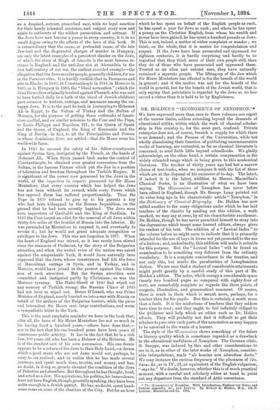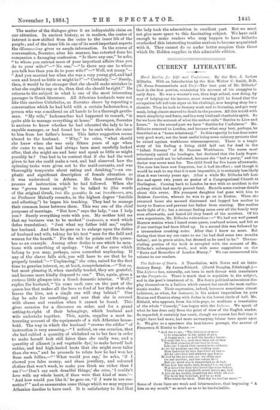DR. HOLDEN'S " CECONOMICUS OF XENOPHON."* WE have expressed more
than once in these columns our regret at the narrow limits, seldom extending beyond the demands of educational utility, within which the work of classical scholar- ship in this country is, for the most part, confined. Private enterprise does not, of course, furnish a supply for which there is no demand ; and the Presses of the Universities, while not wholly abandoning their function of publishing unremunerative works of learning, are contented, as far as classical literature is concerned, to send forth little beyond schoolbooks. We gladly acknowledge, on the other hand, a, certain compensation in the widely extended range which is being given to this academical literature. The teacher of thirty years ago had but a narrow choice of text-books, when we compare it with the list of those which are at the disposal of his successor of to-day. The latest, if indeed it is the latest, addition to Messrs. Macmillan's Classical Series, is an illustration of what we have been saying. The UJconomicus of Xenophon has never before been edited in England, though Mr. George Long pointed out its value long ago in his characteristic article " Xenophon," in the Dictionary of Classical Biography. Dr. Holden has now added another to the many obligations under which he has laid teachers of the classics by sending out this edition, a work marked, we may say at once, by all his characteristic excellences. Dr. Holden, though he has never permitted himself to stray into the digressions which tempt some learned editors, always gives his readers of his best. The addition of a " Lexical Index " to the volume before us might seem to indicate that it is primarily intended for the use of boys in forms not yet promoted to the use of a lexicon ; and, undoubtedly, this addition will make it suitable for this purpose. But the " Lexical Index " will be found on examination to be something very different from the ordinary vocabulary. It is a complete concordance to the treatise, and not only this, but marks the peculiarities of Xenophontean diction. We are sure that a student of considerable attainments might profit greatly by a careful study of this part of Dr. Holden's edition. The notes, which occupy a considerable space (nearly two hundred pages as compared with eighty-four of text), are remarkably complete as regards the three points of exegesis, illustration, and grammatical comment. Of course, there is much in them which is meant more, perhaps, for a teacher than for his pupils. But this is certainly a merit more than a fault. It is the misfortune of teachers that they seldom have time to read ; and they ought to feel infinitely obliged to the guidance and help which an editor such as Dr. Holden affords. They will probably not find it difficult to get their scholars to pass over such parts of the annotation as may happen to be unsuited to the wants of a learner.
The style of the Economicus shows something of the defect in literary quality which is sometimes regarded as a drawback to the educational usefulness of Xenophon. The German critic, G. Sauppe, was induced by this and other considerations to see in it, as in other of the later works of Xenophon, consider- able interpolations, made " ab homine non admodum docto." We may instance the curious frequency of the pleonasm of ipn, &c., as in IV., 21, an equivalent of the English vulgarism, " says he." We doubt, however, whether this is of much practical moment, with a careful and scholarly editor at hand to point out any departure from the standard of Attic correctness.
• The aoonomieus of Xenophon. With Introduction, Explana'ory Notes, and Critical Appendix, &c., and Lexical). By Hubert A. Holden, M.A., LL.D. London : Macmillan and Co. 1881.
The matter of the dialogue gives it an indisputable claim on our attention. In ancient history, as in modern, the centre of interest is now shifted from the outer to the inner life of the people; and of the inner life in one of its most important aspects the CEeono7nicus gives us ample information. In the course of conversation, Socrates, after his manner, has extorted from his companion a damaging confession. "Is there any one," he asks, " to whom you entrust more of your important affairs than you do to your wife ?"—" No one."—" Is there any one to whom you talk less than you do to your wife ?"—" Well, not many."— " And you married her when she was a very young girl, and had seen and heard as little as might be?"—" Certainly."—" Surely, then, it would be far stranger that she should make mistakes in what she ought to say or do, than that she should be right !" He returns to the subject in what is one of the most interesting passages in Greek literature. All Athenian husbands were not like this careless Critobulus, as Socrates shows by repeating a conversation which he had held with a certain Ischomachus, a person who was considered on all hands to be a thorough gentle. man. "My wife," Ischomachus had happened to remark, "is quite able to manage everything at home." Hereupon, Socrates 'is anxious to know whether he had educated the lady to be a capable manager, or had found her to be such when she came to him from her father's house. This latter suggestion seems absurd to the husband. "Why," he cries, "what should she know when she was only fifteen years of age when she came to me, and had always been most carefully looked after, that she might see and hear and speak as little as might possibly be ? One had to be content that if she had the wool given to her she could make a vest, and had observed how the spinning tasks were given out to the maid-servants, and was thoroughly temperate about eating and drinking,"—an em- phatic and significant description of female education as it was understood in Athens. He then describes this process of instruction which he had followed. When she was "grown tame enough" to be talked to (the words of the original Greek, xespoiAn; yy 'Loci irerdciasin-o, are, as Professor Mahaffy remarks, in the highest degree "forcible and affecting,") he began his teaching. They had to manage their common home between them. This was one of the chief purposes of marriage. "But how," says the lady, "can I help you ? Surely everything rests with you. My mother told me that my business was to be modest" (aoppopiiy, a word which defies translation). " Just what my father told me," replies her husband. And then he goes on to enlarge upon the duties 'of husband and wife, taking for his text "man for the field and woman for the hearth." For the wife he points out the queen- bee as an example. Among other duties is one which he men- tions with something of apology. "One of the cares which belong to you may, perhaps, seem somewhat nnpleasing. If any of the slaves falls sick, you will have to see that he be properly treated."—" Unpleasing," she cries, raised for the first time to genuine interest, or, at least, comprehension.—" Not so, but most pleasing if, when carefully tended, they are grateful, and become more kindly disposed to one." This, again, gives a curious little glimpse into a Greek domestic interior. " Well," replies the husband," 'tis some such care on the part of the queen-bee that makes all the bees so fond of her that when she leaves the hive, not a single one will stay behind." One day he asks for something, and sees that she is covered with shame and vexation when it cannot be found. This gives occasion for a discourse on order, and for a grand setting-to-right of their belongings, which husband and wife undertake together. This, again, supplies a most in- teresting account of the equipments of a rich Athenian house- hold. The way in which the husband "crowns the edifice" of instruction is very amusing,—" I noticed, on one occasion, that she had rubbed a quantity of whitelead on to her face in order to make herself look still fairer than she really was, and a quantity of alkanet [a red vegetable dye] to make herself look redder, and had high-heeled boots that she might seem taller than she was," and he proceeds to relate how be had won her from such follies,—"' What would you say,' he asks, if I showed you false money, and sham jewellery, and coloured clothes that won't wash, to make you think me richer than I am ?'—' Don't say such dreadful things,' she cries, couldn't love with my whole heart, if thou were that kind of man?— ' And how would you like it,' he goes on, if I were to use cos- metics?' " and so enumerates some things which we may suppose Athenian dandies to have used. It is satisfactory to find that
the lady took the admonition in excellent part. But we must not give more space to this fascinating subject. We have said enough to make readers who may happen to have hitherto overlooked this interesting treatise anxious to become acquainted with it. They cannot do so under better auspices than those which Dr. Holden supplies in this admirable edition.















































 Previous page
Previous page